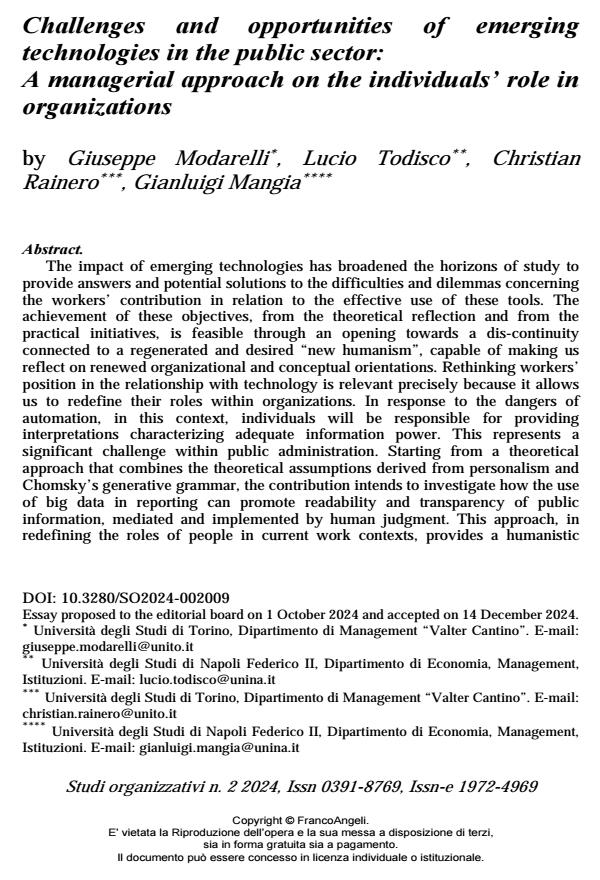Challenges and opportunities of emerging technologies in the public sector: A managerial approach on the individuals’ role in organizations
Journal title STUDI ORGANIZZATIVI
Author/s Giuseppe Modarelli, Lucio Todisco, Christian Rainero, Gianluigi Mangia
Publishing Year 2025 Issue 2024/2
Language English Pages 35 P. 175-209 File size 434 KB
DOI 10.3280/SO2024-002009
DOI is like a bar code for intellectual property: to have more infomation
click here
Below, you can see the article first page
If you want to buy this article in PDF format, you can do it, following the instructions to buy download credits

FrancoAngeli is member of Publishers International Linking Association, Inc (PILA), a not-for-profit association which run the CrossRef service enabling links to and from online scholarly content.
The impact of emerging technologies has broadened the horizons of study to provide answers and potential solutions to the difficulties and dilemmas concerning the workers’ contribution in relation to the effective use of these tools. The achievement of these objectives, from the theoretical reflection and from the practical initiatives, is feasible through an opening towards a dis-continuity connected to a regenerated and desired “new humanism”, capable of making us reflect on renewed organizational and conceptual orientations. Rethinking workers’ position in the relationship with technology is relevant precisely because it allows us to redefine their roles within organizations. In response to the dangers of automation, in this context, individuals will be responsible for providing interpretations characterizing adequate information power. This represents a significant challenge within public administration. Starting from a theoretical approach that combines the theoretical assumptions derived from personalism and Chomsky’s generative grammar, the contribution intends to investigate how the use of big data in reporting can promote readability and transparency of public information, mediated and implemented by human judgment. This approach, in redefining the roles of people in current work contexts, provides a humanistic framework of analysis in management, contrary to some predictive literary interpretations.
Keywords: Big data, knowledge management, organizational strategy, public sector, emerging technologies
- Editorial: Organizational governance in a cha(-lle)nging world: A critical perspective between potentials and fears Giuseppe Modarelli, in Corporate Governance and Organizational Behavior Review /2025
DOI: 10.22495/cgobrv9i2editorial - Foreseeing the future: anticipatory governance as a response to the technological and managerial challenges in the public sector Lucio Todisco, Gianluigi Mangia, Paolo Canonico, Federica Langella, in International Journal of Public Sector Management /2025 pp.1
DOI: 10.1108/IJPSM-03-2025-0109
Giuseppe Modarelli, Lucio Todisco, Christian Rainero, Gianluigi Mangia, Challenges and opportunities of emerging technologies in the public sector: A managerial approach on the individuals’ role in organizations in "STUDI ORGANIZZATIVI " 2/2024, pp 175-209, DOI: 10.3280/SO2024-002009